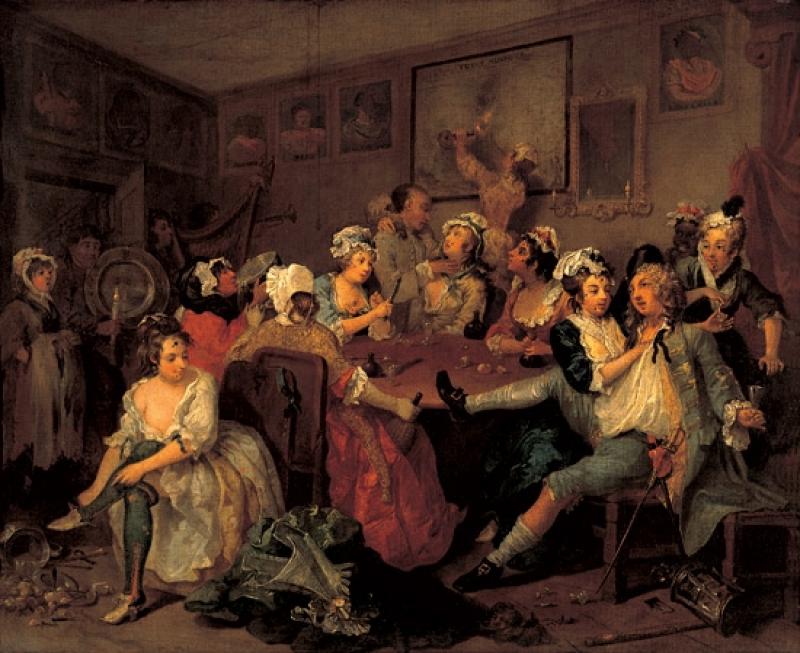The Rake's Progress, Royal Opera House | reviews, news & interviews
The Rake's Progress, Royal Opera House
The Rake's Progress, Royal Opera House
Are Stravinsky and Lepage well matched?

Not everyone was playing for the same team in last night's revival production of The Rake's Progress. On the one side were the conductor, choir and soloists, all focused in their service and submission to unravelling this quietly brilliant piece of neoclassicism by Stravinsky - mostly pretty effectively.
Lepage transplants Auden's Hogarthian tale not unwisely to the 1950s world of "the American dream", to the oil fields of the Midwest and the Hollywood temptations of the West Coast. However, the detachment of the visuals - of the concept as a whole, in fact - from the music and the libretto cuts the work adrift and emphasises the biggest problems with the production's conception. If a peformance of The Rake's Progress is to work at all, it must have a pretty decent Rake and an equally robust Progress. Both were absent at the Royal Opera House.
It's a wonder that Toby Spence (reprieving the role of Tom Rakewell here), such a handsome and generously voiced tenor, cannot seem to project these talents into a convincing or thoughtful stage presence. He started well, with a Texan's case for the defence of Rakewell's plans for fame and fortune; it was delivered with plenty of gusto. But from then on, one was always one step ahead of him, always unsurprised by what turn he made and bemused by those he did. The few spoken lines especially exposed his inability to internalise the role.
The lack of "Progess", meanwhile, sprang from the lack of intellectual integrity to the Lepage concept. The moral dilemmas were never very sharply delineated or forcefully put. One modestly rakish venture - some filmed slap-and-tickle and light cocaine-snorting - would follow another without there being much sense of a shocking ethical slippage (except late on, and even then just in act not in emotion) that a rake's progress usually entails.
So the night required saving. And there were two ready to save: conductor Ingo Metzmacher (always worth your while) and Rosemary Joshua as Anne Trulove, both of whom seemed to immerse themselves in their roles better than anyone else. There was something absolutely captivating about Joshua's rain-coated, furrow-browed pursuit of Tom, her love. Most of this was down to a vocal, rather than physical, acting ability; a natural, almost effortless way to inhabit each and every note, so that, like in everyday speech, all was both expected and a surprise. As the words moved, her body moved; as the emotions frayed, the face frayed.
Trulove has particularly ravishing orchestral beds on which to sit, mainly lined with oboes or horn and strings, paired. In Metzmacher's hands, these delicate threads resembled the softness and suppleness of a Mozart adagio. The work is filled with these contemplative arias and ariosi, and they were, every one, a joy. Kyle Ketelsen's Nick Shadow, in fine voice, was almost there but not quite. That I barely noticed Patricia Bardon's Baba the Turk - a bearded lady - is quite an achievement.
Though we missed a key dialogue between the intellectual thread of the libretto and the conceit of the visuals, with Meztmacher and Joshua burring away so beautifully throughout, a work that is widely thought of as cold ultimately came alive.
- The Rake's Progress continues at the Royal Opera House until 3 February.
- Check out what's on in the Royal Opera House season
The future of Arts Journalism
You can stop theartsdesk.com closing!
We urgently need financing to survive. Our fundraising drive has thus far raised £49,000 but we need to reach £100,000 or we will be forced to close. Please contribute here: https://gofund.me/c3f6033d
And if you can forward this information to anyone who might assist, we’d be grateful.

Subscribe to theartsdesk.com
Thank you for continuing to read our work on theartsdesk.com. For unlimited access to every article in its entirety, including our archive of more than 15,000 pieces, we're asking for £5 per month or £40 per year. We feel it's a very good deal, and hope you do too.
To take a subscription now simply click here.
And if you're looking for that extra gift for a friend or family member, why not treat them to a theartsdesk.com gift subscription?

Add comment